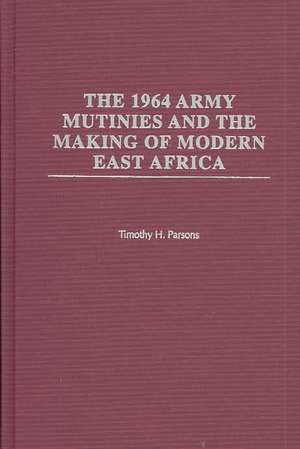The 1964 Army Mutinies and the Making of Modern East Africa
Autor Timothy H. Parsonsen Limba Engleză Hardback – 29 mar 2003 – vârsta până la 17 ani
Preț: 498.24 lei
Preț vechi: 811.34 lei
-39% Nou
Puncte Express: 747
Preț estimativ în valută:
95.34€ • 99.74$ • 79.20£
95.34€ • 99.74$ • 79.20£
Carte tipărită la comandă
Livrare economică 02-16 aprilie
Preluare comenzi: 021 569.72.76
Specificații
ISBN-13: 9780325070681
ISBN-10: 0325070687
Pagini: 248
Dimensiuni: 156 x 235 x 24 mm
Greutate: 0.52 kg
Ediția:New.
Editura: Bloomsbury Publishing
Colecția Praeger
Locul publicării:New York, United States
ISBN-10: 0325070687
Pagini: 248
Dimensiuni: 156 x 235 x 24 mm
Greutate: 0.52 kg
Ediția:New.
Editura: Bloomsbury Publishing
Colecția Praeger
Locul publicării:New York, United States
Notă biografică
TIMOTHY H. PARSONS holds a joint appointment as an Associate Professor in the history department and the African and Afro-American Studies program at Washington University in St. Louis.
Cuprins
IntroductionThe Nature of Colonial Military ServiceThe Colonial Army and IndependenceThe Askaris Intervene, January 1964The Legacy of the Barracks Revolts, 1964-1971ConclusionAppendix: InterviewsSelected BibliographyIndex













